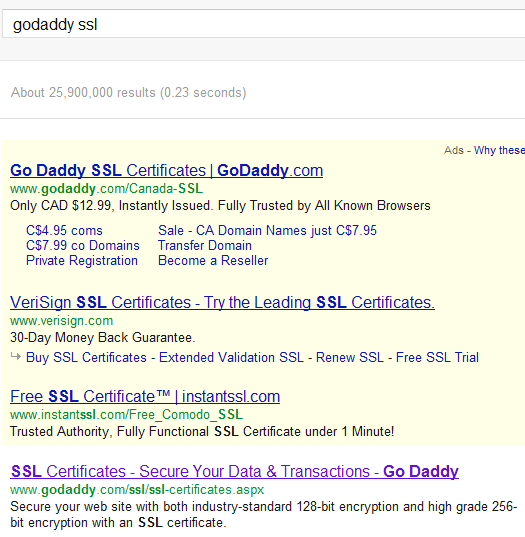Go Daddy domain name and SSL automatic discounts: click on their Google ad
First published on February 19, 2012
For as long as I can remember, GoDaddy.com ads appear at the top of many GoDaddy-related Google searches and provide discounts that are not automatically available if you click on the normal, “organic” search result. While many people ignore Internet text (and image) ads, if you are about to register or renew a domain name or an SSL certificate with Go Daddy, this might be the one exception where it is advantageous to pay attention to, and click, the ad.
For reasons unknown to me (other than perhaps it simply makes them more money overall, or that Google doesn’t allow such fine-grained control over when an ad appears and when it doesn’t), GoDaddy automatically applies discounts if you click on a paid ad of theirs even on search results where the GoDaddy.com website appears first. Of course, you can still get the same discounts if you check coupon sites such as RetailMeNot and manually apply the coupon, but not everybody thinks or remembers to do that.
Here is an extreme example, where you are looking to buy a basic SSL certificate for a website and search for “godaddy ssl” in Google:

Notice how the top normal result leads to a GoDaddy.com page. If you click on that result and proceed to buy a 1-year SSL certificate, you will be charged the full price of $71.88:

If you click on the paid ad, the same certificate is only $12.99:

The process and behavior is similar for domain names as well. I’ve never purchased or researched other related products and services with Go Daddy, but this might apply in other cases as well.

 Facebook
Facebook Twitter
Twitter Email this
Email this keung.biz. Hire my web consulting services at
keung.biz. Hire my web consulting services at  Follow us on Twitter
Follow us on Twitter


February 20th, 2012 at 7:28 pm
Pacific says:
Great tip, I’ll use it next time I’m buying a domain.
I always use Godaddy.